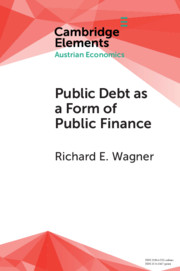Element contents
Public Debt as a Form of Public Finance
Published online by Cambridge University Press: 26 March 2019
Summary
Keywords
- Type
- Element
- Information
- Series: Elements in Austrian EconomicsOnline ISBN: 9781108696050Publisher: Cambridge University PressPrint publication: 30 May 2019
References
- 8
- Cited by

